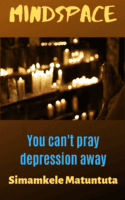You turn on the television or read a newspaper or open up any news app, and you are confronted by yet another young person who has lost their life to depression. Now, why am I bringing up depression again when there have been previous columns on it published on this same platform?
The thing is, while the author, Michelle Myeko eloquently explained what depression feels like (read On depression and symptoms of depression), I couldn’t help but think about how it (and other mental illnesses) is still stigmatised in black communities.
Black families can be very prideful; they tend to hide anything that might bring shame to the family. In this case, it is depression. Many families would much rather not deal with depression than risk neighbours learning about it. If they do choose to deal with it, they don’t do it with the seriousness and urgency it deserves.
The big problem here is that the majority of elders in the black community (educated or not) still believe that a young person cannot suffer from depression. If any young person claims that they do, they are merely seeking attention. They are directly or indirectly told they don’t know what they are talking about. Even if a young person shows any common signs of depression, such as anger, irritability, reckless behaviour, loss of interest in their favourite activities, etc; the elders often choose to believe that they’re possessed by a demon that’s making them “act out”. All of this completely disregards the experiences of a young person suffering from depression.
The bigger issue though is that many in the black community still don’t understand depression (and other mental illnesses). There’s no real education of what it is, what it means, and what causes it. This is how myths start to circulate. Generally, when people encounter the unknown, they tend to make up stories about it. These stories then become the truth to the people receiving them.
The myths end up carrying a lot more weight than the actual truth about depression. Another factor that contributes to the negative reception of depression is the language barrier. Depression is difficult to define in South African indigenous languages. It’s already a complicated thing to understand in English; it is then more complicated to explain in other local languages. So, the combination of the language barrier, lack of knowledge – and/or misinformation – makes it even harder for the elders in black communities to understand that depression is a medical condition. That it’s a chronic illness that doesn’t discriminate according to race, class, education level, gender, and age.
All of this makes it that much harder for teens and young adults to initiate and navigate such a difficult conversation with their elders. Those who try are either forced to consult a sangoma or to go to a church where the demon that’s causing them to act out can be prayed away. Going through this can be very humiliating and embarrassing.
This is why we can’t just pray depression away. Thinking that we can is dangerous and can further trigger self-stigmatisation. Self-stigmatisation means that the person who suffers from depression believes the stereotypes and misconceptions society has about depression. Stereotypes such as they’re “crazy”, “weak”, “unstable”, “damaged” etc. This causes a person who suffers from depression to internalise these negative feelings, and they don’t seek help because they feel ashamed, confused and hopeless.
When a person who suffers from depression doesn’t seek help, they are at risk of committing suicide. The World Health Organization released a report last year indicating that suicide is the second leading cause of death among 15-29-year-olds. And earlier this month, the South African Depression and Anxiety Group (SADAG) reported that depression is still a leading cause of suicide in the country.
“Undiagnosed or untreated depression can lead to suicide, and it’s something that should be taken seriously. It’s a real illness like diabetes, hypertension, or cancer, and it needs real treatments.”
This was said by SADAG operations director, Cathy Chambers, and I agree with all of it, because while it is completely alright for people who are religious to seek assistance from their churches, and this can be very helpful, it also shouldn’t end there. Depression is not an illness that can just be cured by prayers. And the elders in the black community need to understand this.
They need to understand and acknowledge the role that they play as elders in driving the youth to suicide. They need to understand that depression among black youth is a prevalent issue that needs urgent attention and real solutions. They need to understand that the youth need and deserve to get help from trained professionals. Because depression is a challenge that affects just about everyone. It starts with the person who suffers from it and also affects everyone around them.
Tell us: how can we break the social stigma around depression and other mental illnesses?
This blog also forms part of our Rights 2.0 – Bridging Divides project. Find out more here.


